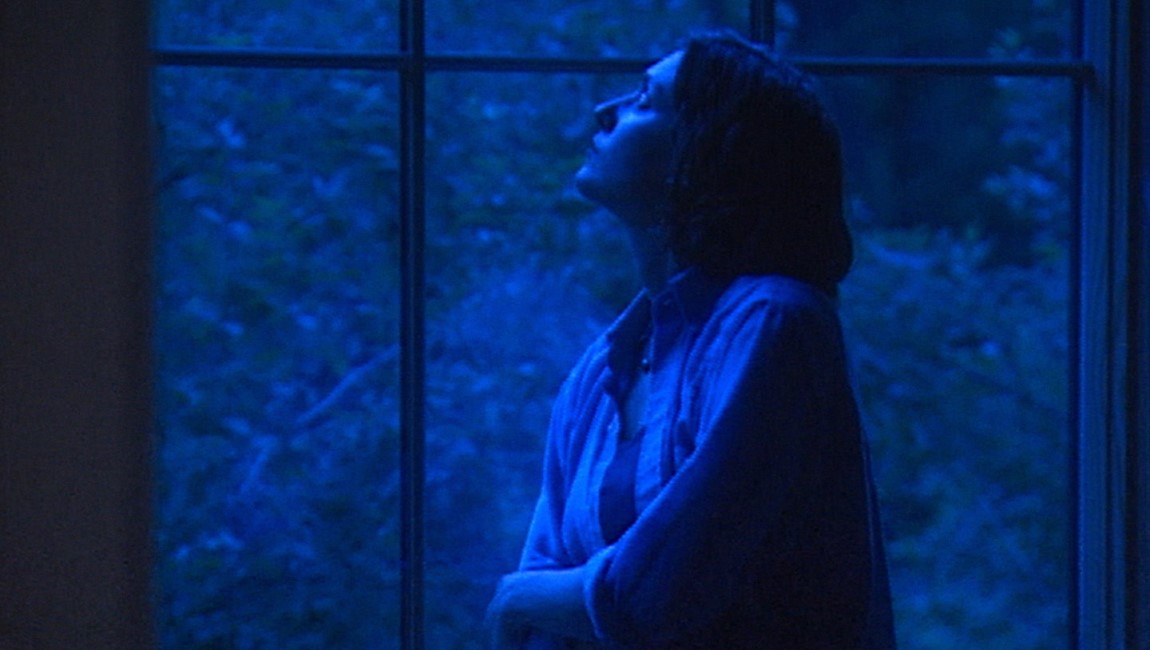The first shot is a marvel — a quiet, lovely reverie that ends with a punch to the gut. As a young couple walk hand in hand in a picturesque park setting, the camera cranes in over them, tracks them down a path, and slowly twirls around, as if swooning (or dancing). The man, Fonny (Stephan James), and woman, Tish (newcomer KiKi Layne), are in color-coded outfits that visually establish the link between them: her coat matches his shirt, his denim jacket matches her blouse. It’s a careful bit of rhyming, less ostentatiously fussy than someone like Wes Anderson. but no less evocative and precise. The couple continues to walk quietly, then Tish moves away from Fonny and turns so that the two are facing each other. The score rises in the mix. Tish’s image is now juxtaposed not against the lush foliage of the park, but framed by the bustling busyness of the city freeway in the background — clearly, she and Fonny have stepped out of their Eden.
After the lovers embrace, and kiss delicately but passionately, the image cuts to black. We hear Tish in voice over: “I hope that nobody has ever had to look at anybody they love through glass.” The next shot is of Tish, waiting in front of a prison partition, getting ready to speak to Fonny. The sharp cut between these scenes perfectly represents the reality of James Baldwin’s world, of paradise lost. In fact this opening sequence — and the various flashbacks to Tish and Fonny’s relationship prior to his arrest — are so fully realized that they render certain other parts of Beale Street‘s narrative almost superfluous. Secondary characters drop in for little vignettes, scenes that are beautifully shot and acted, but that take away from the real emotional core of the film. Some make an impression regardless: Regina Hall and Colman Domingo, even with their limited screen time, establish Tish’s parents as stern but caring forces in her life. One could even argue that the ‘interruptions’ to the love story are part of the point: There is no happy ending for Tish and Fonny, only cold, hard reality intruding whether they want it to or not.
Jenkins and Paxton use the camera like a tender caress; their palate is somehow muted yet vibrant, and their subtle color coding (wallpaper that matches drapes that matches a purse; pastels juxtaposed with harder primaries), mixed with warm light over cold backgrounds and vice versa, creates a kind of visual tension in scenes that could have just played as two people talking.
Whatever its flaws may be, If Beale Street Could Talk is an undeniably major accomplishment, one that cements Barry Jenkin as one of our premier contemporary filmmakers (as if that evidence was really needed anymore after the miraculous Moonlight). The film’s cinematography, by James Laxton, breathtakingly evokes soft, diffuse shadows, delicate textures, and a sensual quality, with close-ups of hands, eyes, and mouths. Jenkins and Paxton use the camera like a tender caress; their palate is somehow muted yet vibrant, and their subtle color coding (wallpaper that matches drapes that matches a purse; pastels juxtaposed with harder primaries), mixed with warm light over cold backgrounds and vice versa, creates a kind of visual tension in scenes that could have just played as two people talking. Beale Street is a masterclass in its production elements and costume design.
But of course that barely scratches the surface of its this film’s ambitions — namely, the very real social and racial stakes of the story that Jenkins is dealing with in Baldwin. Suffice it to say that the familiarity with much of these injustices in our own time should be enough to break anyone’s heart. Actor Mahershala Ali, in an interview with critic Todd VanDerWerff, summed things up nicely when he was asked about the role of storytelling and art: “I feel like filmmaking, creating content, is really an opportunity to listen… You have to listen to these characters. You have to have empathy and listen to somebody’s story. Somebody’s story or experience has to resonate with you, whether it be fiction or nonfiction. There’s something about it where you feel like: This needs to exist.” Whatever its artistic accomplishments are (and there are many), it also has to be said that Barry Jenkins’s film needs to exist, and that the world is a better place for it.







